- Weight Watchers and Jenny Craig are the most effective commercial weight-loss programs for overweight or obese patients.
- Authors reviewed 39 were randomized, controlled studies.
- At 12 months, Weight Watchers participants achieved at least 2.6% greater weight loss compared to participants who were assigned to control/education.
- Jenny Craig resulted in at least 4.9% greater weight loss at 12 months versus control/education and counseling.
Weight Watchers and Jenny Craig are the most effective commercial weight loss programs according to the results of a meta-analysis of randomized controlled studies (RCTs) published recently in the Annals of Internal Medicine. Clinicians can confidently refer overweight or obese patients to treatment in these programs, the authors concluded. Americans are among the heaviest citizens in the world (Figures 1 and 2).

(Source: Organisation for Economic Co-operation and Development/Wikipedia.)

(Source: Creative Commons.)
- Nutrisystem resulted in ≥3.8% greater weight loss at 3 months versus control/education and counseling.
- Very-low-calorie programs such as Merck's Health Management Resources (HMR), Medifast, and OPTIFAST resulted in ≥4.0% greater short-term weight loss versus counseling; mixed results beyond 6 months.
- The Atkins diet resulted in 0.1% to 2.9% greater weight loss at 12 months versus counseling alone.
- Results for SlimFast were mixed.
Affordable Care Act and Commercial Weight-Loss Programs
The Affordable Care Act contains provisions that are forcing physicians to screen patients for obesity. As a result, doctors are increasingly referring patients to commercial weight-loss programs. “Recent weight management guidelines from the American Heart Association (AHA)/American College of Cardiology (ACC)/The Obesity Society (TOS) recommend that clinicians refer patients with overweight and obesity to high intensity programs,” the authors noted in the Annals of Internal Medicine. Overall, weight-loss program revenues are expected to continue to grow. Some U.S. states will see faster growth in this market area than others (Figure 2.)

(Source: Wikipedia.)
The challenge for physicians is that the ACA guidelines do not contain specific recommendations as to which programs are most effective for patients. The Annals study provides a comprehensive review of the available commercial programs.
“Currently, 3 programs dominate the weight loss services industry–Weight Watchers, Jenny Craig and Nutrisystem. These 3 programs are high intensity, and 2 rely on low-calorie meal replacements. Our findings show that Weight Watchers’ participants consistently lose more weight than control/education participants, which they sustain beyond 12 months. While we conclude that Weight Watchers has weight loss efficacy, it is unclear whether Weight Watchers is superior to behavioral counseling. Jenny Craig participants consistently had a greater sustained weight loss as compared to both control/education and counseling participants, including among patients with diabetes mellitus,” the authors explained in the Annals.
The researchers noted that the Weight Watchers program is one of the lowest-cost alternatives. It has also been shown be the most cost-effective weight management strategy as compared to other commercial programs and medications, they explained.
The Jenny Craig program has been found to be more expensive than Weight Watchers. However, the price tag on the Jenny Craig program includes the cost of food but Weight Watchers does not. “Given these findings, it may be reasonable for clinicians to refer patients to Weight Watchers or Jenny Craig, especially if they lack the time, training, or ancillary staff to deliver behavioral counseling in their practices,” the authors advised.
The Analysis
The authors conducted a meta-analysis of RCTs in order to compare weight loss, adherence, and harms of commercial or proprietary weight-loss programs versus control/education (no intervention, printed materials only, health education curriculum, or <3 sessions with a provider) or behavioral counseling among overweight and obese adults.
They used the MEDLINE database and the Cochrane Database of Systematic Reviews to identify studies published before November 2014. Included were RCTs of ≥12 weeks' duration and prospective case series of ≥12 months' duration.
The authors analyzed 39 RCTs. At 12 months, Weight Watchers’ participants achieved ≥2.6% greater weight loss than did control participants who received only education. Participants in the Jenny Craig program achieved ≥4.9% greater weight loss at 12 months versus controls who received both education and counseling. Nutrisystem participants achieved ≥3.8% greater weight loss at 3 months compared with control participants who received education or counseling.
Very-low-calorie programs such as Merck’s HMR, Medifast, and Optifast resulted in ≥4.0% greater short-term weight loss than did counseling. However, the reviewers found some diminution of the effects beyond 6 months. “Atkins achieved 0.1–2.9% greater weight loss at 12 months than counseling. Results for SlimFast were mixed. We found limited evidence to evaluate adherence or harms for all programs and weight outcomes for other commercial programs,” they explained.
